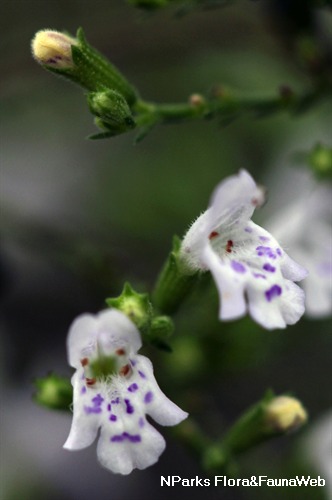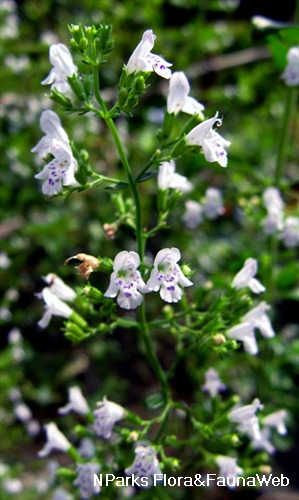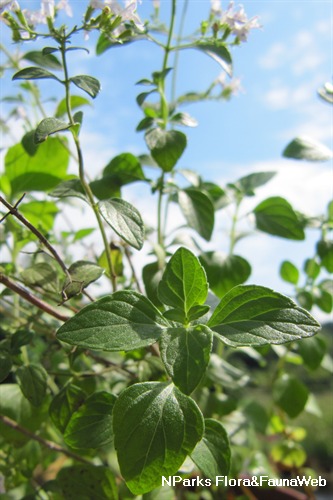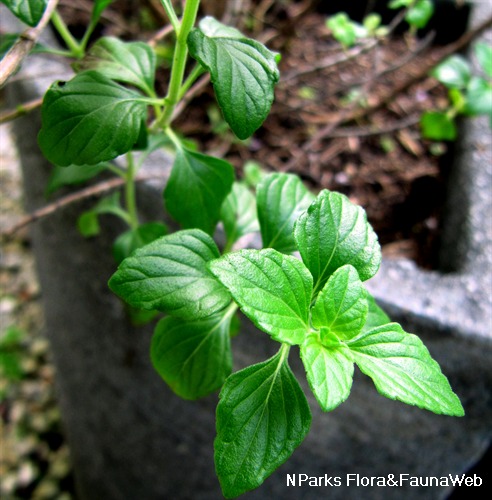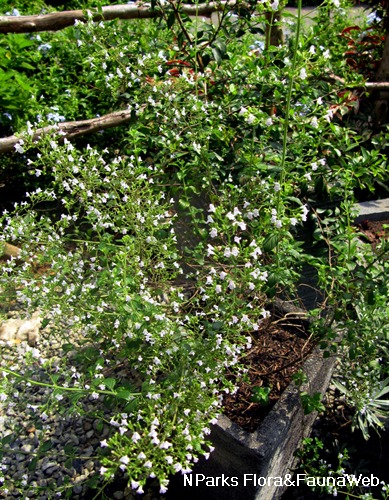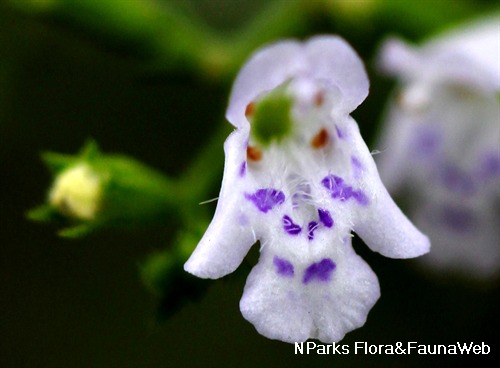
Back
Clinopodium nepeta subsp. spruneri (Boiss.) Bartolucci & F.Conti
| Family Name: | Lamiaceae (Labiatae) |
| Synonyms: | Clinopodium nepeta subsp. glandulosum (Req.) Govaerts, Calamintha nepeta subsp. glandulosa (Req.) P.W.Ball, Melissa glandulosa (Req.) Benth., Calamintha nepeta Willk. |
| Common Name: | Lesser Calamint, Nepetella, Nepitella, Calamint, Field Balm |
Name
Classifications and Characteristics
| Plant Division | Angiosperms (Flowering Seed Plants) (Dicotyledon) |
|---|---|
| Plant Growth Form | Herbaceous Plant |
| Lifespan (in Singapore) | Perennial |
| Mode of Nutrition | Autotrophic |
| Maximum Height | 0.2 m to 0.9 m |
Biogeography
| Native Distribution | Southern Europe to Great Britain. |
|---|---|
| Native Habitat | Terrestrial (Grassland / Savannah/ Scrubland, Disturbed Area / Open Ground) |
| Preferred Climate Zone | Temperate, Mediterranean |
| Local Conservation Status | Non-native |
Description and Ethnobotany
| Growth Form | Perennial herb up to 45 cm tall. |
|---|---|
| Foliage | Egg-shaped to round leaves occur in pairs along the stem. Crushed leaves have a mint- and lemon-like fragrance. |
| Flowers | White, light purple or pink flowers occur in a verticillaster inflorescence where paired clusters of flowers resemble a whorled arrangement. |
| Fruit | Its tiny fruits are 0.9-1 mm by 0.5-0.6 mm. |
| Habitat | It grows in open grasslands. |
| Associated Fauna | Its flowers are pollinated by bees. |
| Cultivation | It can be propagated by seed or stem cutting. |
| Etymology | The genus Clinopodium is derived from the Greek 'klino' meaning slope/ bed and 'podos' meaning one foot. The specific epithet nepeta is a reference to Nepi, a town in ancient Italy. |
| Ethnobotanical Uses | Food (Herb or Spice): Its leaves are dried and used as tea leaves. Medicinal: Traditional Medicinal Uses It is reported to treat weaknesses of the stomach, depression, insomnia and painful menstruation. However, it should not be consumed by pregnant women as excessive consumption is said to cause miscarriages. It is important to note that some therapeutic effects from traditional medicinal uses of plants are not currently supported or verified by scientific research. |
Landscaping Features
| Landscaping | It is suitable for growing as a ground cover in gardens as it has a bushy and rhizomatous habit. |
|---|---|
| Desirable Plant Features | Fragrant (Foliage) |
| Landscape Uses | Small Gardens, Flowerbed / Border, Groundcover |
| Thematic Landscaping | Fragrant / Aromatherapy Garden |
Fauna, Pollination and Dispersal
| Pollination Method(s) | Biotic (Fauna) |
|---|---|
| Seed or Spore Dispersal | Abiotic |
Plant Care and Propagation
| Light Preference | Full Sun |
|---|---|
| Water Preference | Moderate Water |
| Plant Growth Rate | Fast |
| Rootzone Tolerance | Moist Soils, Well-Drained Soils, Fertile Loamy Soils |
| Propagation Method | Seed, Stem Cutting |
Foliar
| Foliage Retention | Evergreen |
|---|---|
| Mature Foliage Colour(s) | Green |
| Young Flush Texture(s) | Hairy / Hirsute |
| Foliar Type | Simple / Unifoliate |
| Foliar Arrangement Along Stem | Opposite |
| Foliar Attachment to Stem | Petiolate |
| Foliar Shape(s) | Non-Palm Foliage (Ovate) |
| Foliar Venation | Pinnate / Net |
| Foliar Margin | Serrate / Toothed |
| Foliar Apex - Tip | Acute |
| Foliar Base | Rounded / Obtuse |
Floral (Angiosperm)
| Flower & Plant Sexuality | Bisexual Flowers |
| Flower Colour(s) | White, Purple, Pink |
|---|---|
| Flower Grouping | Cluster / Inflorescence |
| Flower Location | Terminal |
| Flower Symmetry | Bilateral |
| Individual Flower Shape | Tubular, Labiate / Lipped |
| Inflorescence Type | Spike |
| Flower Size | 2 cm |
| Inflorescence Size | 45 cm |
Fruit, Seed and Spore
| Mature Fruit Colour(s) | Green |
|---|---|
| Fruit Classification | Simple Fruit |
Image Repository
Others
| Master ID | 31257 |
|---|---|
| Species ID | 5652 |
| Flora Disclaimer | The information in this website has been compiled from reliable sources, such as reference works on medicinal plants. It is not a substitute for medical advice or treatment and NParks does not purport to provide any medical advice. Readers should always consult his/her physician before using or consuming a plant for medicinal purposes. |

